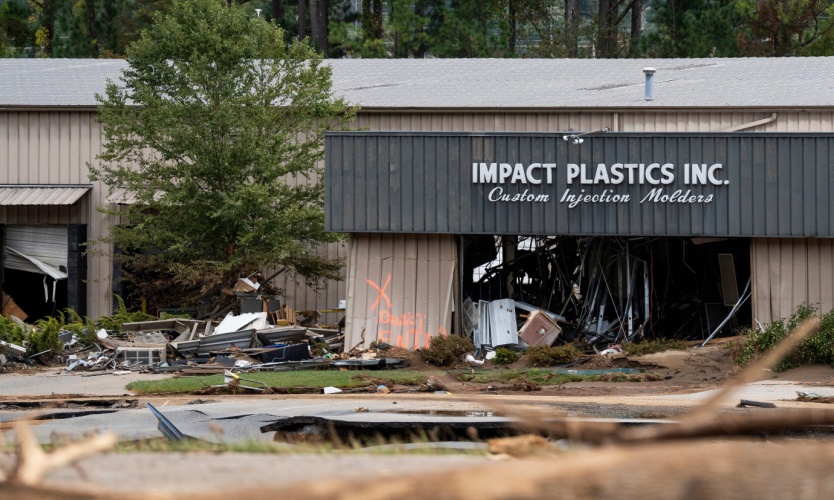Natural disasters put spotlight on safety protocols
- July 19, 2025
- Posted by: Web workers
- Category: Workers Comp

Natural disasters such as hurricanes and tornados are increasing the focus on what employers must do to protect workers and prevent injuries, as recent events have spurred negligence lawsuits claiming that two companies put workers in harm’s way.
On Sept. 27, Hurricane Helene caused deadly flooding in Erwin, Tennessee, resulting in the death of several workers at Impact Plastics, which faces a lawsuit filed Oct. 14 by a surviving family member who alleges the company forced workers to stay at their posts despite dangerous conditions.
Impact Plastics has denied that it acted improperly. In a statement issued Oct. 4, company President and CEO Gerald O’Connor stated that “employees were told to leave the plant at least 45 minutes before the gigantic force of the flood hit the industrial park.” At least six workers were killed and several remained missing at the time the lawsuit was filed.
The lawsuit mirrors two filed against Mayfield Consumer Products LLC in 2022 following a deadly tornado on Dec. 10, 2021, that leveled a candle factory in Mayfield, Kentucky, immediately killing six workers, the Occupational Safety and Health Administration said in a citation issued over the company’s alleged lack of emergency action planning. Multiple news outlets have reported that nine people ultimately died as a result of the event.
One lawsuit alleges that “despite knowing of the severity of the risk posed by the weather … including tornadic activity, and the ill-suited nature of the factory for shelter from such weather, they chose not to dismiss any employees or other people at the factory, which denied them the ability to seek and take safe shelter.“
William Nefzger, an attorney with Bahe Cook Cantley & Nefzger PLC in Louisville, Kentucky, who is representing several workers in the Mayfield case, said discovery in the lawsuit is ongoing and that the company has denied wrongdoing.
Mayfield contended in court filings that it had workers compensation immunity, meaning those who were injured and the families of those who were killed are barred from suing the company. Mr. Nefzger said the motions “didn’t surprise him.”
States differ on whether natural disasters can be a trigger for a workers compensation claim, and the conditions required are fact-specific: Were their warnings? Did the catastrophe hit a widespread area? Was the person’s job related to the event, such as emergency response?
Kentucky allows for such comp claims, but in the Mayfield case the plaintiffs claim “valid exceptions” to comp exclusivity, basing their lawsuit on alleged negligence, according to court records. The company has denied workers compensation claims for several plaintiffs, arguing that the workers were now seeking a civil remedy, according to court documents.
New York is another state that allows for comp claims in natural disasters under certain conditions, according to Richard Donohue, a managing partner in the Bay Shore, New York, law office of McIntyre, Donohue, Accardi, Salmonson & Riordan LLP.
Mr. Donohue, who represents plaintiffs, said, “There are still the dangers of a lawsuit … even with a work comp defense.” He said a best practice for employers is to pay attention to OSHA’s requirement that companies have a plan in place for emergencies.
Andrew Brought, a Kansas City, Missouri-based attorney with Spencer Fane LLP who represents employers in OSHA matters, said companies are beginning to take heed of weather issues and emergency preparedness, mostly because the federal agency is paying more attention to the requirements. The lawsuits are also drawing attention to the issue, he said.
“Once viewed as acts of God, or things that are not predictable and that you can’t control, increasingly regulatory agencies are taking the position that these severe weather events are occurring with such regularity that they’re becoming foreseeable. And so … you need to have emergency action plans in place,” he said.
In the lawsuits in both Kentucky and Tennessee, the plaintiffs are claiming that the companies either did not have plans in place or that workers were not trained effectively.
Matt McDonough, St Louis-based assistant vice president of risk services at Safety National Casualty Corp., said changing weather patterns are another cause for employers to pay more attention.
“The increase in frequency and expansion of the traditional ‘tornado alley’ is certainly concerning and warrants additional attention,” he wrote in an email. “Employers should have plans in place that cover what to do, where to shelter and how communication will be handled.”



